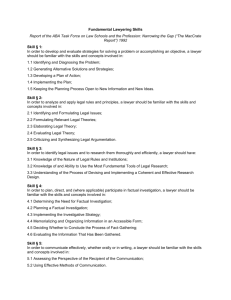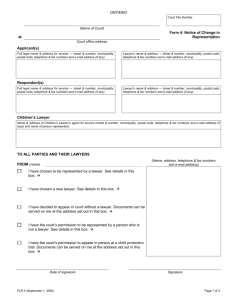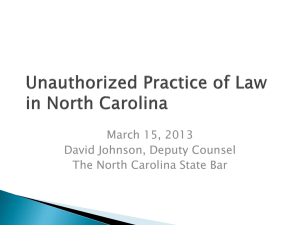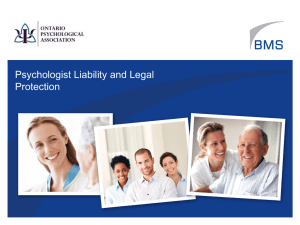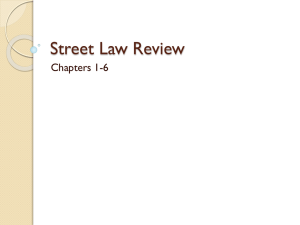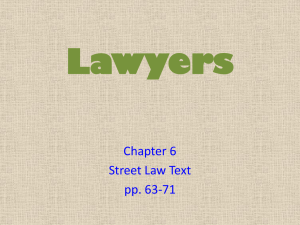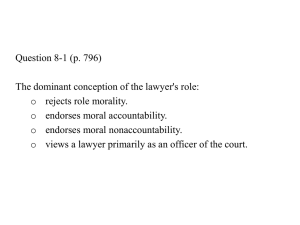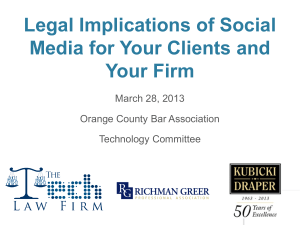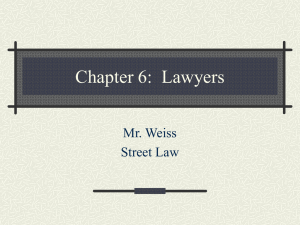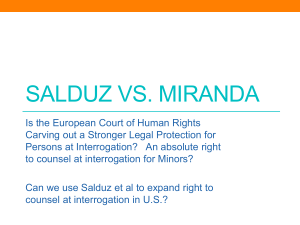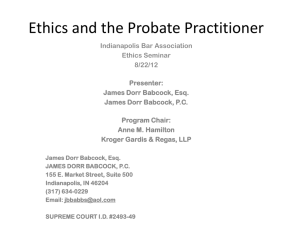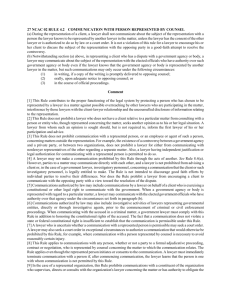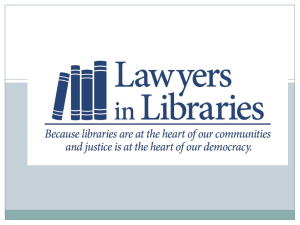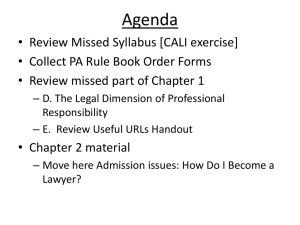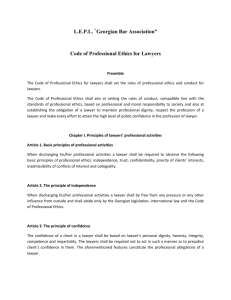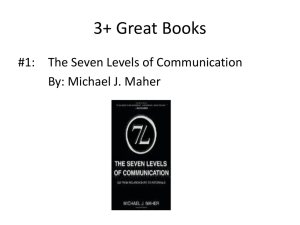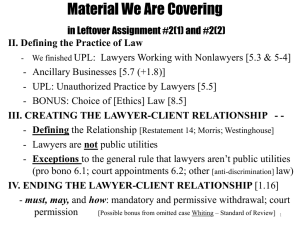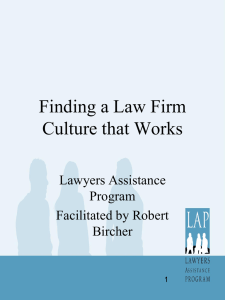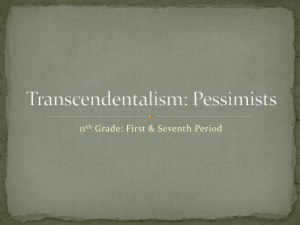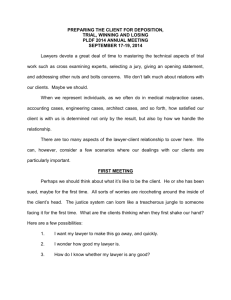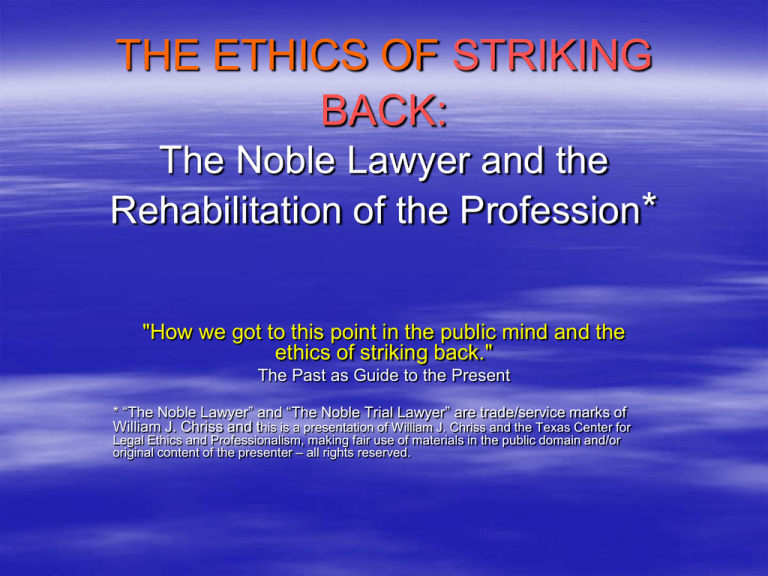
THE ETHICS OF STRIKING
BACK:
The Noble Lawyer and the
Rehabilitation of the Profession*
"How we got to this point in the public mind and the
ethics of striking back."
The Past as Guide to the Present
* “The Noble Lawyer” and “The Noble Trial Lawyer” are trade/service marks of
William J. Chriss and this is a presentation of William J. Chriss and the Texas Center for
Legal Ethics and Professionalism, making fair use of materials in the public domain and/or
original content of the presenter – all rights reserved.
STRIKING BACK! ETHICS AND
REHABILITATING THE PROFESSION:
LIBERTY AND JUSTICE FOR ALL
THE ROOT OF OUR PROBLEMS:
LAW and CULTURE
Marc Galanter, Univ. Wisconsin, Lowering
the Bar: Lawyer Jokes and Legal Culture
(2005).
Michael Asimow, “When Lawyers Were
Heroes,” 30 U.S.F.Law Rev. 1131 (1996);
“Embodiment of Evil: Law Firms in the
Movies,” 48 U.C.L.A. Law Rev. 1339
(2001).
Reasons the Problem is Important to
Ethicists
A Very Large Number
of Serious Grievances
are Attributed to:
– Substance Dependence
– Depression
Which in turn feed on low
self-esteem and
feelings of
helplessness.
More Reasons: Ethical Obligations
Rule 1.13 Comment: “For reasons of public policy, it is not generally
considered a conflict of interest for a lawyer to engage in law reform
activities even though such activities are adverse to the interests of the
lawyer’s private clients. A lawyer’s representation of a client does not
constitute an endorsement of the client’s political, economic, social, or
moral views, nor does he forego his own.”
Rule 8.02 limits what a lawyer can say about judicial officials because:
“false statements by a lawyer can unfairly undermine public confidence
in the administration of justice.”
Preamble: “a lawyer should seek improvement of the law (and)
administration of justice…should cultivate knowledge, …(and) employ
that knowledge in reform of the law …
Preamble: “A lawyer should demonstrate respect for the legal system and
those who serve it…While it is a lawyer’s duty, when necessary, to
challenge the rectitude of official action, it is also a lawyer’s duty to
uphold legal process.”
1954-1967: Good Times
The New Frontier & Striving for Equal Rights
Law and Culture: Vintage
1960’s (Movies)
Mockingbird: 1962; Witness 1957; Anatomy: 1959; Inherit 1960; Nuremberg: 1961
Law and Culture: Vintage 1960’s
(T.V.)
Mason: 1957-66; Defenders 1961-65; Judd: 1967-69 ; Marshall 1971-74
The late 1960’s and the Turn Against Law:
(This discussion is not a matter of partisan politics
but of History and Sociology).
1970s: Progressivism, Good and
Bad
PRESIDENTS: T. R. & Carter
Texas 1973:
– DTPA, Ins. Code
– Article 2212a (comparative fault)
– Mushrooming of product liability and new
theories of recovery.
The Benefit: Greater protection for
consumers and workers.
The Cost: Greater regulation and
increased visibility of, and imposition by,
the legal system.
The late 1970’s and the Ultimate Turn
Against Law
Chief Justice Warren Burger’s
1976 Pound Conference
speech: “Unless we devise substitutes
for courtroom processes-and do so quicklywe ,may well be on our way to a society
overrun by hordes of lawyers, hungry as
locusts, and brigades of judges in numbers
never before contemplated.”
1978 Newsweek: “Americans in all
walks of life are being buried under
an avalanche of lawsuits.”
1978-1988 The Turn as Grassroots
Anti-Government
1978-9: Howard Jarvis,
the Tax Revolt and the
Original Proposition 13.
The rebirth of small
government
conservatism: The
Reagan Revolution
Why This Resonated: Law as
Omnipresence and the Demand for
Rules
Every year, the federal bureaucracy creates
7,000 new regulations. About 3-4,000 of
these carry criminal penalties.
Rising taxes and government spending.
The secularization of society
Sociologists describe a post-modern
replacement of informal norms by
formal norms or rules.
The Rest of the Story: 1988-1996
60 Minutes: “Justice for Sale”
“Law Reform,” by laypeople
beginning in Missouri,Texas,
and California:
Wedge Issue:
– NY Times (August 31, 1992): The
President's aides have found something
they think is even scarier to voters than
Willie Horton: …sharp lawyers in tasseled
loafers who, as Mr. Bush put it in his
speech to the Republican convention, are
running wild, terrorizing doctors and even
Little League coaches with personal-injury
suits, malpractice suits and other kinds of
liability cases.
1996-Present: Neither Party Has a
Monopoly on Lawyer-bashing
One Political Consultant’s advice circa 1996:
“Few classes of Americans are more reviled by the general public than
attorneys, and you should tap into people’s anger and frustration…It’s
almost impossible to go too far when it comes to demonizing
lawyers….Make fun of them mercilessly and they will not know how to
respond. They truly are the one group in society that you can attack
with near impunity.”
Galanter, p. 209.
This Corresponds with a Massive and
Unprecedented Proliferation of New Lawyer
Jokes.
Lawyer Jokes as the Key to
Understanding the Problem
There have always
been lawyer jokes.
But their number has
radically increased
since 1985.
And they have changed
in substance.
So What Do We Do Now?
Recognize the source of the Problem: Not
Lawyers but Bureaucracy.
The Libertarian Argument for Lawyers:
Medical License claims up 39% since 2003.
Stand up like Aggies!
KILL THE MYTHS (Wealth, lottery, etc.)
The Solution: Striking Back for
Rights and the Rule of Law
Work together to exclude the
uncommitted: Law School vs.
Private Practice. Law School
Applications dropped 6.7%
Understand the difference
between advertising and public
education.
ORDINARY PEOPLE ARE
THE PROFESSION’S
BEST FRIENDS.
STAND FOR LIBERTY
AND JUSTICE FOR
ALL.
The Noble Lawyer Still Survives
In a 2003 A.F.I. listing, Atticus
Finch ranked #1 among all
movie heroes; and in a 1991
survey of reading habits, only
the Bible outranked To Kill a
Mockingbird as having “made
a difference” in readers’
lives.*
He stood with the oppressed,
even when it was unpopular
to do so.
*Galanter, p. 7
Ethical Shorthand: The Noble
Lawyer
Dedicates herself to public service, in
whatever form;
Is committed to American democratic values
and teaches them to others;
Values common people, common sense and
common ways;
Is not in it for the money
Is identified, in everything he or she does,
with LIBERTY AND JUSTICE FOR ALL.
The Noble Lawyer Strikes Back
Abraham Lincoln and Dr. Phineas
Gurley’s Wednesday night
sermons.
The Texas Center for Legal
Ethics and Professionalism: AT
www.txethics.org
State Bar of Texas Public
Education Project: “Doing Justice
for Texas.”

